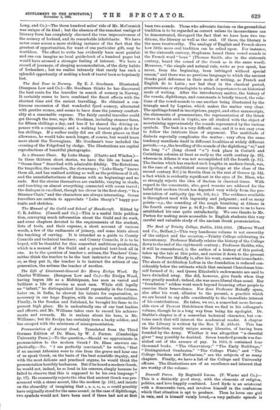Pronunciation of Ancient Greek. Translated from the Third German Edition
of Dr. Blass, by W. J. Parton. (Cambridge University Press.)—To the question,—Should we approximate in pronunciation to the modern Greek ? Dr. Blass answers em- phatically,—No. " I am perfectly convinced," he writes, "that if an ancient Athenian were to rise from the grave and hear one of us speak Greek, on the basis of the best scientific inquiry, and with the most delicate and practised organs, he would think the pronunciation horribly barbarous. But if he heard a modern Greek, he would not, indeed, be so loud in his censure, simply because he failed to observe that this is supposed to be his own language" (p. 17). He summarily rejects the idea that ancient Greek was pro- nounced with a stress accent, like the modern (p. 131), and insists on the absurdity of imagining that i, n, v, et, ot, in could possibly have originally stood for the same sound; in the case of diphthongs, two symbols would not have been used if there had not at first been two sounds. Those who advocate itacism on the ground that tradition is to be regarded as correct unless its incorrectness can be demonstrated, disregard the fact that we have here two tra- ditions, the literary as well as the oral. Of these, the literary is the more trustworthy. The analogy of English and French shows how little mere oral tradition can be relied upon. For instance, in the sixteenth century, Steph anus heard three vowel sounds in the French word " beau " (Thomas Smith, also in the sixteenth century, heard the sound of the Greek nu in the same word). Moreover, "the simple and natural rule, write as you speak, has never, from the beginning, been infringed without special reason," and there was no previous language to which the ancient Greeks paid deference in their mode of writing, as French and English do to Latin ; nor had they in the clasSical period, grammarians or etymologists to attach importance to an historical mode of writing. After the introductory matter, the history of the vowels, diphthongs, and consonants is briefly traced, the rela- tions of the vowel-sounds to one another being illustrated by the triangle used by Lepsius, which makes the matter very clear. The spellings found in inscriptions, papyri, and other manuscripts, the statements of grammarians, the representation of the Greek letters in Latin and in Coptic, are all studied with the object of ascertaining approximately the sounds represented by the various symbols. The task is a very difficult one, and it is not easy even to follow the intricate lines of argument. The multitude of dialects especially complicates the matter : very often the same tendency manifests itself in different localities at widely different periods,—e.g., the levelling of the sounds of the diphthong "ei," and the long " e" (long closed " e ") took place in Corinth and Corinthian colonies at least as early as the sixth century (p. 29), whereas in Athens it was not accomplished till the fourth (p. 31). The itacism which has reached such lengths in modern Greek, was, in the case of n, established sooner (perhaps at the close of the second century B.C.) in Bceotia than in the rest of Greece (p. 34), a fact which is evidently significant in the eyes of Dr. Blass, who so strongly rejects the idea of itacism in classical times. With regard to the consonants, also, good reasons are adduced for the belief that modern Greek has departed very widely from the pro- nunciation of antiquity (pp. 84, 105, &c.) The evidence available is throughout used with ingenuity and judgment ; and on many points—e.g., the sounding of the rough breathing at Athens in the fourth century (see p. 94 ff.)—Dr. Blass seems to us to have established his case quite satisfactorily. We owe thanks to Mr. Purton for making more accessible to English students this very careful and valuable study of the ancient Greek pronunciation.






















































 Previous page
Previous page